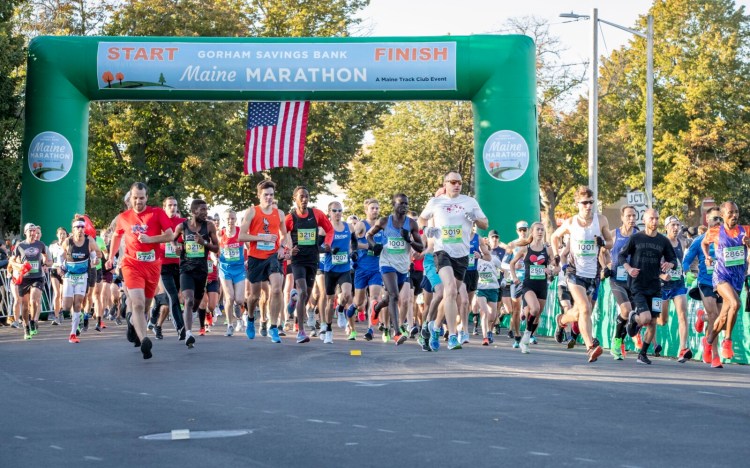When she ran distance at Yarmouth High School, Abby Hamilton used to join her teammates as water-station volunteers along Route 88 for competitors in the Maine Marathon, traditionally held the first Sunday of October.
“I remember watching the lead woman in the race,” Hamilton said earlier this week. “I remember thinking I want so bad to do that someday.”
That someday comes Sunday for Hamilton, now a 22-year-old graduate of Bates College who will be attempting her first marathon in the 30th edition of the Gorham Savings Bank Maine Marathon, Half Marathon and Marathon Relay. Last year’s event was held as a virtual race because of the coronavirus pandemic.
Sunday’s race comes on the heels of cancellation announcements for marathons in Caribou (mid-September) and Mount Desert Island (mid-October). Organizers of the Maine Marathon are requiring all entrants, volunteers and vendors to show proof of vaccination or a negative COVID-19 test taken no earlier than Thursday.
The new policy has met with approval from most runners, said race director Bob Dunfey, who also is offering a virtual component for runners unwilling or unable to join the field of approximately 3,300.
“I would guess 90 percent or better of the participants are supportive or happy about it,” he said. “Registrations are coming in at the same volume (this week) as two years ago, perhaps better. That’s a good indicator that asking for proof of vaccination or a negative test is not hurting registration.”
The marathon will bring together the largest road race field in Maine since the start of the pandemic. The Beach to Beacon 10K, the state’s largest race annually with more than 6,000 runners, was not held as an in-person event in 2020 or 2021.
The out-and-back Maine Marathon course begins next to Portland’s Back Cove and stretches north along Routes 1 and 88 through Falmouth and Cumberland before turning around in Yarmouth and heading back to the city. Runners must navigate construction work on Baxter Boulevard and Veranda Street that in some places will require them to take a stone dust trail rather than the road.
They must show vaccination or negative test documentation to pick up their bibs, either before entering Saturday’s race expo from 11 a.m. to 7 p.m. at Sullivan Gym at the University of Southern Maine in Portland or early Sunday morning at Pedro Field.

Runners race along Portland’s Baxter Boulevard during the 2017 Maine Marathon. Ariana van den Akker/Press Herald file photo
An elite field of roughly 50 is scheduled to leave the start at 7:45 a.m. Sunday and compete for prize money paid to five places, with $1,000 earmarked for the marathon winner of each gender and $500 to the half marathon champions. Seven different charitable beneficiaries will divide $40,000 in race proceeds.
A COMMUNITY AFFAIR
All other runners will be funneled across a narrowed starting line to prevent congestion on the course. Masks are required at the start, but can be removed on the course. Because each runner will be wearing a computer chip, their race clock won’t begin until they actually cross the start line.
Although Hamilton aims to break 3 hours, her time won’t be the most important factor Sunday. The pandemic wiped out her senior year of cross country and track at Bates while at the same time sharpening her appreciation for running.
Sunday marks her first road race in five years. Her mother, Valerie, also plans to run the marathon.
“The pandemic made me realize I just love it,” Abby Hamilton said. “I just want to go out there and have fun and reconnect with what I love best about running, and that’s the community. I think that’s going to be extra special on Sunday.”
Matt Rand understands. A 30-year-old Cape Elizabeth native who now lives in Portland, Rand is using Maine as a tune-up for the Houston Marathon in mid-January.
Rand’s last marathon was the U.S. Olympic Trials in Atlanta in February 2020. He qualified for that with a blazing time of 2 hours, 18 minutes, 36 seconds in Indianapolis two years ago.
In the pandemic era, Rand has run four races, and described only one of them, a 5-kilometer event in Connecticut, as a positive experience. Small field sizes with lots of restrictions and no spectators don’t bring out his best.
BRINGING OUT HIS BEST
“The ones I did didn’t feel like races,” he said. “It’ll be nice to just get out there and compete and feel like I’ll be running a road race again. Having a lot of people around you really gets the adrenaline going.”
Sarah Mulcahy of Fort Kent also ran in the marathon trials in Atlanta. She had planned to run Caribou and defend her 2019 MDI title, and didn’t want to waste three-and-a-half months of marathon training. On Saturday, she will spend most of the day on her feet at the Festival of Champions high school cross-country meet in Belfast.
“We’re going to see how it rolls,” said Mulcahy, 36, who teaches and coaches at Fort Kent High.
While a veteran marathoner such as Mulcahy has a good idea of what to expect on Sunday, a newcomer such as Nyaruot Nguany will arrive with a mix of emotions. Sunday isn’t simply her first marathon, it’s her first road race of any distance.
“I’ve always been a runner, but I definitely got more into it during the pandemic,” said Nguany, 29, who lives on Peaks Island. “I’m terrified to what the impact may be on my body, but even if I have to walk the last six miles, I’m going to do it. It’s been on my radar for quite a while now.”
Send questions/comments to the editors.




Comments are no longer available on this story